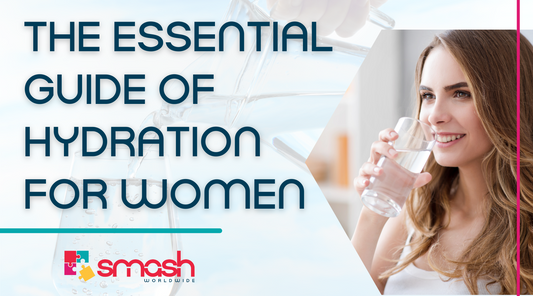The Essential Guide to Hydration for Women
Staying hydrated is one of the simplest yet most powerful things you can do for your immediate and long term health. While everyone needs to stay hydrated, women often face unique challenges and considerations when it comes to meeting their daily water needs. Whether you're navigating the ups and downs of the menstrual cycle, juggling the demands of pregnancy, going through the hell that can be perimenopause or simply trying to keep your skin glowing, understanding hydration is key. Let’s dive into the essentials every woman should know about staying well hydrated.

How Much Water Do You Really Need?
You've probably heard the old advice to drink eight glasses of water a day, but hydration isn’t one-size-fits-all. The general recommendation for women is about 2.7 litres of water per day, which includes fluids from all beverages and food. This tends to equate to 2 litres of pure water and the rest is from your food. However, factors like your age, weight, activity level, and even the weather can affect up your water needs.
If you are exercising a lot, in a hot area, you will need more because you are sweating more. The best approach to know how much you need to be drinking is to listen to your body and understand your cues for drinking water. If you can drink before you get thirsty, as becoming thirsty is a sign from your body that you are starting to become dehydrated.
Recognising the Signs of Dehydration
It’s easy to forget to drink enough water, especially if you don’t like water, but your body has ways of reminding you to drink it. Early signs of dehydration include thirst, dry mouth, fatigue, and darker urine. If you are experiencing any of these signs on a regular basis, you really need to look at your water intake.
If you’re feeling dizzy, have a rapid heartbeat, or experience confusion/brain fog, you might be more dehydrated than you realise. A 2% drop in hydration can cause drop in your cognitive abilities which can be scary to think of. Keep a water bottle handy and sip throughout the day to avoid experiencing these symptoms and dehydration having an impact on your daily routine.

Hydration and Your Hormones
Did you know that your menstrual cycle can affect how much water you need?
Hormonal fluctuations, particularly during your Autumn Week (Luteal Phase), can lead to bloating and fluid retention. Ironically drinking more water can actually help manage these symptoms. Additionally, you may need extra hydration during your period, especially if you're experiencing heavy blood loss or excessive tiredness.
You may find that your balance and sporting performance may suffer during your Autumn Week as well. This is due to water retention. Being aware of this means that you can adapt accordingly - and not beat yourself up if you are not performing to your normal high standards
Hydration is Crucial During Pregnancy and Breastfeeding
If you're pregnant or breastfeeding, your hydration needs are even higher. Water plays a crucial role in supporting your growing baby and then producing breast milk. Staying hydrated can help prevent constipation, a common issue during pregnancy that can cause issues.
You may not feel like drinking a lot of water during the later stages of your pregnancy, due to the pressure on your bladder but aim to drink water consistently throughout the day to keep both you and your baby healthy.

The Link Between Hydration and Skin Health
As a woman, we all want healthy, glowing skin that keeps us looking younger for longer, and staying hydrated is one of the easiest ways to achieve it. Drinking enough water helps maintain skin elasticity, keeping it plump and reducing the appearance of wrinkles. Think of the impact of the lack of water on a grape. It becomes very wrinkly and saggy as it turns into a raisin!! Think of your skin like that when it is dehydrated. You really want to look like a grape rather than a raisin.
Good hydration also supports your skin’s ability to flush out toxins, potentially reducing breakouts and keeping your complexion clear. This is really important for teenagers as they start to suffer from breakouts as they go through puberty. Many teenagers don’t drink enough water - but drink sugary drinks instead - and this will have a knock on impact on their skin. Encourage them to drink more water to help their skin.
Staying Hydrated When Exercising
Whether you’re a gym bunny or just enjoy a daily walk, hydration is key to optimising your physical performance and the results that you wish to achieve. Drink water before, during, and after exercise to replace fluids lost through sweat. If you’re working out intensely or in hot weather, consider a drink with added electrolytes to maintain your fluid balance.
Calculate the amount of water you should be drinking after a gruelling sweaty session of exercise by using this simple calculation:
- Weigh yourself before you exercise, then weigh yourself after exercise.
- Calculate how many grams you have lost and then multiply by 1.5.
- For example, if you have lost 200g, you will need to drink 300 mls of water to replace the water that you have lost. If you lost lost 1kg, that would equate to 1.5 litres of water.
By doing this it means that you can keep your body hydrated and preforming well, and you will not suffer from poor brain function after a heavy workout before work.
The Importance of Electrolytes When Exercising
Electrolytes like sodium, potassium, and magnesium are essential for maintaining your body’s fluid balance. While most people get enough electrolytes from their diet, if it is a healthy, minimally processed diet, there are times when you might need a extra—such as after intense exercise or when you’re recovering from illness.
If you require extra electrolytes, an electrolyte-enhanced drink can help you stay properly hydrated. However, please be careful with some of the brands on the market. Many use a sweetener called sucralose and this can be damaging to gut health, killing half of the good bacteria in your gut and cause gut issues.
I highly recommend you make your own electrolyte drink with freshly squeezed fruit juice (lemon, lime, or orange), add a pinch of Celtic Sea Salt, and pure water. This way you know exactly what is in it, and, you are saving money and the environment by not buying store bought ones.

Hydration’s Role in Urinary Health
One of the best things you can do to support your urinary health is to drink plenty of water. Staying hydrated helps flush out bacteria from your urinary tract, reducing the risk of urinary tract infections (UTIs). This is key during your perimenopause years when women are more prone to kidney infections.
Proper hydration also supports kidney function and can help prevent painful kidney stones.
Dehydration Due to Caffeine and Alcohol
Many women enjoy coffee or wine now and then, and it is often used as a stress reliever, but, both caffeine and alcohol can be dehydrating and have negative impacts on the body. Caffeine and alcohol increase urine production, which can lead to dehydration when drank in excess.
In order to decrease the risk of dehydration, drink a glass water alongside your tea, coffee or wine, especially when on a night out.
Hydration and Your Brain
Dehydration doesn’t just affect your body—it can impact your mind too. Even mild dehydration (2%) can lead to difficulties with concentration, mood swings, and reduced cognitive function. If you’re feeling foggy or easily distracted, a glass of water might be just what you need to clear your head.
During perimenopause, you may suffer from more brain fog, due to changes in oestrogen levels. When you couple this with low fat diets and low levels of hydration, it is a recipe for disaster when it comes to cognitive function. Make sure you are eating enough health fats and drinking enough water during these year to minimise the impact.

Hydration and Weight Management
Did you know that staying hydrated can help with your weight management? Sometimes, our bodies confuse thirst with hunger, leading us to eat when we really just need a drink.
Being well hydrated can boost your metabolism and support fat burning. Your body needs water to properly break down and burn fat and by being properly hydrated you can help this happen better. When you are well hydrated, you will also have more energy for exercise, and this can also have a positive impact on your weight management.
Some people/companies recommend having a glass of water before meals to help control your appetite and avoid unnecessary snacking, but I do not. When you drink too much water before you eat your main meals, you are diluting your stomach acid, which then can cause digestive issues down the line. I recommend regularly drinking water to ensure you are hydrated and also focus on eating a health diet - The SMASH Way - and you will be able to manage your weight.
Hydration for Digestive Health
Water plays a critical role in digestion. It helps break down food, absorb nutrients, and move waste down through your digestive tract. Staying hydrated can also prevent common digestive issues like constipation and bloating, keeping your gut happy and healthy. By simply increasing your water intake, you can improve your gut health.
Hydration is more than just drinking water—it's about understanding your body’s unique needs and responding to them. By being aware of the factors that affect your hydration, you can support your overall health, boost your energy levels, manage your weight and feel your best every day.
So, get your water bottle filled up and hydrate like your life depends on it, because it does.




